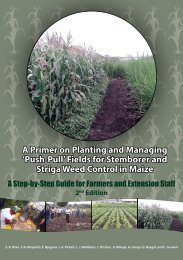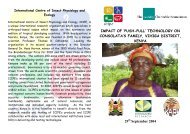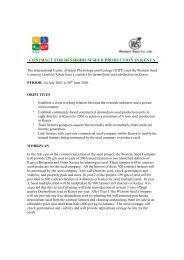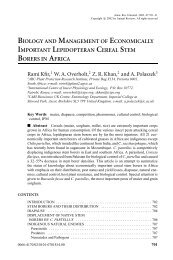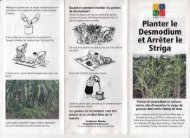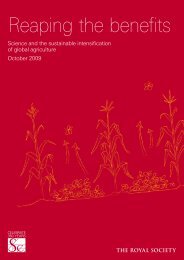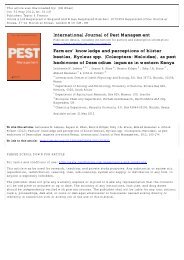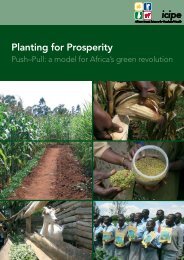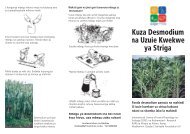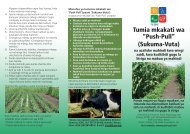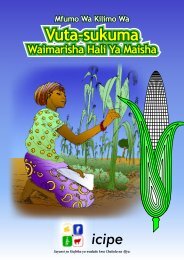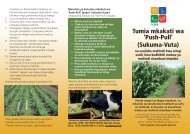Genetic engineering versus organic farming. - Push-Pull
Genetic engineering versus organic farming. - Push-Pull
Genetic engineering versus organic farming. - Push-Pull
Create successful ePaper yourself
Turn your PDF publications into a flip-book with our unique Google optimized e-Paper software.
Regina Fuhrer, president ofthe Swiss Organic Farmersassociation:"I'm an <strong>organic</strong> farmer. For me it'sobvious that genetic <strong>engineering</strong>has to be kept out of agriculture.The risk of contamination is fartoo big. But above all we havemuch better solutions, dealingcarefully and respectfully withnature."• In the field: Pollen from genetically engineeredplants is blown by wind or carried by insectsinto other fields, thus contaminating these crops.Bees are known to distribute pollen over adistance of 3 kilometres.• In seed production: Breeding and multiplicationof <strong>organic</strong> seed and seedlings is also affectedby contamination from pollen from GM-plants.• During harvesting, transport and processing:At all points from the field to the final processingfacility (during transport on trucks, ships ortrains, in mills, in food-processing factories etc.)there are many opportunities for contamination.Only strict segregation can minimise the risk.Farmers, processors and traders wanting to produceand sell <strong>organic</strong> and GMO-free products; andconsumers wanting to buy it, are confronted withmassive problems of genetic pollution.Another problem is that the pests may developresistance to the Bt-toxin of transgenic plants. Btspraysare also used in <strong>organic</strong> <strong>farming</strong>, however,as an effective, natural insecticide. If this resistancewere to occur they would become ineffective.6. Will genetic <strong>engineering</strong>feed the hungry ?No agricultural revolution has ever solved theproblem of world hunger. Hunger is a social andpolitical problem and not a problem of productiontechniques. There is more than enough food foreverybody in the world today. <strong>Genetic</strong> <strong>engineering</strong>may actually lead to more food insecurity andhunger because it will encourage the planting ofmonocultures, highly vulnerable to disease andpests, and it will make farmers more dependenton multinational companies that will demandpayment for the patented GM-plants and seeds,and for chemicals and fertilisers. GMO-agricultureis the continuation of industrialised agriculture withall its known problems in an even more threateningdimension. Through unequal promotion of anindustrialised GMO-agriculture the naturalresources for all our food – biodiversity, healthysoils and clean water – will be further destroyed.7. Will <strong>organic</strong> <strong>farming</strong> feedthe hungry ?The main question confronting <strong>organic</strong> and sustainable<strong>farming</strong> is: how can farmers increase theiryields with cheap, locally available and simpletechnologies, without damaging the environment?Organic farmers take their fate again in their ownhands, and as many examples show, they can oftenincrease their production – especially in thedeveloping countries – significantly. One example:In Cuba the traditional ‘three-sister-agriculture’with maize, beans and cassava produces yields twiceas high as the sum of each one in monoculture.The maize plants function as bean sticks for beansand the beans fix nitrogen into the soil. Meanwhile,cassava grows well in the shady and damp conditionswith the maize and beans, and helps suppress weeds.Food for all is a long-term project, and only theprotection of biodiversity and the cultural diversityof agriculture adapted to local conditions can secureDr.Tewolde Gebre Egziabher,Ethiopia, leader of ThirdWorld countries in internationalnegotiations aroundpatents, genetic <strong>engineering</strong>and biodiversity, winner ofthe Alternative Nobel prize2000:"With patents big companiesmake our farmers dependentfrom their seed. Here I see a greatrisk for worldwide food securityand biodiversity”.Recommended further reading:IFOAM dossier "Organic Agriculture and Food Security"available at the website or from the Headoffice.



